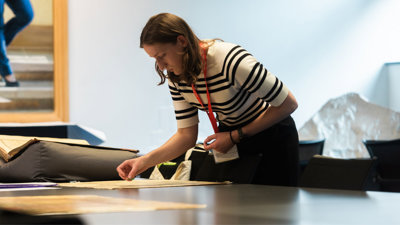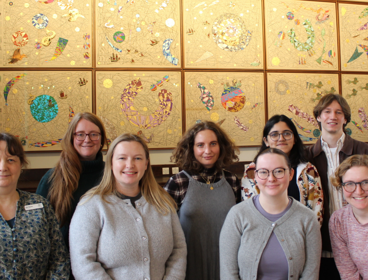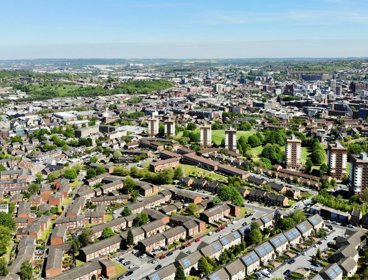This month, we are featuring the work of recent PhD students funded through the Arts and Humanities Research Council (AHRC) Collaborative Doctoral Awards (CDA) programme and finding out more about their research on the Society’s Collections, along with their advice for prospective students.
Today, we are looking at the work of Beth Williamson, whose AHRC Collaborative Doctoral Project at Royal Holloway, University of London (2021 - present) seeks to understand how the Society, particularly through the Orthography Committee, tackled the problem of ‘orthography’ – establishing a common standard for the spelling of place names.
The Orthography Committee was appointed in 1878, with an orthography system initiated in 1885, but has not been researched in-depth until now. Beth has spent a long time in the Collections exploring committee meeting notes, and her work is providing detailed insights into how the Society sought to accurately and authoritatively record the world's place names in the absence of consistency in spelling, pronunciation, and alphabet.
By revealing the imperial underpinnings of orthography, Beth’s work also offers an important opportunity to encourage new audiences to engage with its empirical and material legacies. Beth said: “My research explores the ongoing issues in geography, particularly those tied to colonial histories and their lasting impact on contemporary practices. It challenges these colonial histories by questioning how geographical knowledge – in this case a system of orthography – was constructed, who produced it, and how it was disseminated”.
For Beth, orthography was a new subject to explore and while it was an advertised project, she has been able to shape it into her own. Beth commented: “When I started to explore the Society’s Collections more towards the end of my first year, and began to find relevant material, I became the one with greater knowledge of the topic. This is when the project transitioned, and I could take more ownership of it. My supervisors, both at the Society and at university, shifted into more of a supportive role”.
On the opportunities that the CDA provides, Beth highlighted the benefits of the programme being so closely tied in with the Society’s activities. She is the postgraduate representative for the Historical Geography Research Group, gaining experience in chairing sessions, and helping to organise their annual conference, which will be held in November. She was also able to give a Be inspired lecture and curate a cabinet display in the Ambulatory Corridor of the Society. For Beth, experiences like this offer transferable skills which extend beyond the PhD: “I really enjoy the aspect of taking what I’ve done and sharing it with a wider audience. I’m interested now in working in the heritage sector and have completed a few placements with museums, and this PhD has helped with that”.
On advice for prospective students, Beth said: “I would recommend doing a CDA, not only because it gives you access to material you might not otherwise have, but also because of the support and opportunities it offers. My advice would be to take advantage of as many opportunities as you can, even if it seems like a lot of work at the time – whether it’s being part of a research group, completing a placement, or giving a talk. It’s great to have that additional focus, and the skills and experience gained will be beneficial for future endeavours”.
Beth has a year to go before her PhD is complete, the next steps include finishing her research and writing it up.
Read about previous and current projects, and find out about upcoming opportunities here.



